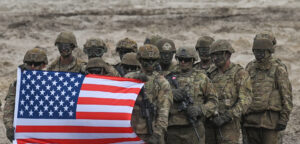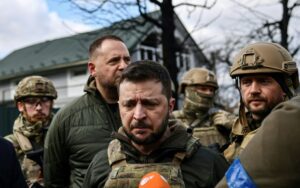In the month since Hamas’s attack, the reduced coverage of the Ukraine war has been a mixed blessing for Zelenskyy and his international backers. Perhaps most obviously, it has caused Ukraine to plummet among the West’s priorities, at a time when political support for continued military aid was already waning. But it has also concealed an uncomfortable truth from the public: Ukraine — and the West — are losing the war.
Even the most ardent supporters of the maximalist victory-at-all-costs narrative are now starting to admit that the Nato-backed counteroffensive has failed. Despite billions of dollars spent and tens of thousands of casualties, Ukraine has barely made any territorial gains, while Russia continues to make significant advances, mostly in the north-east.
In a repeat of its year-long campaign to capture the town of Bakhmut, Russia is now doubling down on its efforts to capture the eastern city of Avdiivka, which has been a symbol of Ukrainian resistance since 2014. According to Oleksiy Arestovych, Zelenskyy’s presidential advisor until January 2023 and now a staunch opponent, the fall of Avdiivka, which would be the seventh city in a row lost by Ukraine, is almost certain. “Everyone in the military knows that troops from the southern front have been transferred to Avdiivka; this means goodbye to the southern offensive,” he further noted.
Speaking to The Telegraph, Arestovych also called the counteroffensive a “disaster” and directly accused Zelenskyy of making several strategic mistakes: “There will be no return to the borders of 1991, and there will be no Crimea in the near future,” he said. Even the US’s much-vaunted provision of long-range ATACMS missiles — which have allowed Ukraine to strike at several targets in Crimea — appear to be falling short of expectations: Russia’s military recently claimed that it had shot down two of them, showing that it is rapidly adapting to new military circumstances.
This reality — which many had predicted — is now starting to dawn even on Western pro-war pundits. As Max Hastings, a long-time believer in military support for Ukraine, put it, “whatever hawkish blowhards may say, the liberation of Crimea and the eastern Donbas is unlikely to happen”.
The real shocker, however, is that this is now being acknowledged, if in slightly more nuanced terms, by Ukraine’s commander-in-chief, General Valery Zaluzhny. Last week, in a surprisingly frank interview with The Economist, Zaluzhny said that “just like in the First World War we have reached the level of technology that puts us into a stalemate. There will most likely be no deep and beautiful breakthrough”. This would require some major military-technological innovation — but “there is no sign that this is around the corner”, he added.
Zaluzhny made several other striking admissions. According to the general, Russia lost at least 150,000 troops — a much lower estimate than the numbers previously circulated by Ukrainian and Western sources. If that is true, it means that Russia has lost almost as many troops as Ukraine, despite having a much larger population; US and European estimates put the Ukrainian death toll at well above 100,000. Not only has this undercut Ukraine’s assumption that it could stop Russia by bleeding its troops, as Zaluzhny admits, but it reveals that, in fact, it is Ukraine that has been bled of troops, in large part as a result of the counteroffensive itself. As the general put it: “Sooner or later we are going to find that we simply don’t have enough people to fight.” The Government, in response, has reacted by enacting harsher conscription policies, but these are already showing their limits. As the Deputy Minister of Defence Natalia Kalmykova recently admitted in a television interview, “hundreds of thousands of citizens are currently trying to avoid mobilisation”.
Zaluzhny doesn’t go as far as saying that the offensive should be abandoned, but this is one conclusion that could be drawn from his assessment that the war has reached a stalemate. Given Zaluzhny’s rank — and the fact that he went on record with this extremely bleak analysis — it’s not surprising to learn that this assessment is shared by most people in Zelenskyy’s entourage. In last week’s Time magazine cover story, Simon Shuster claimed that “Zelenskyy’s associates themselves are extremely skeptical about the [current] policy”.
The one person who seems unwilling to face reality, however, is Zelenskyy himself. In a recent interview with NBC, the Ukrainian president rebuked the notion that the war is in a stalemate — and indeed his office publicly chastised Zaluzhny for his claims, suggesting that his comments would help the Russian invasion. As The New York Times notes, this “signal[s] an emerging rift between the military and civilian leadership at an already challenging time for Ukraine”, as testified by the recent dismissal of Ukraine’s head of special operations forces. In the aforementioned interview, Zelenskyy reiterated his long-standing position: that Ukraine will not negotiate with Russia until it entirely withdraws from Ukrainian territories, concluding that Ukraine is not ready to concede its freedom to the “fucking terrorist Putin”.
As Shuster noted, however, “Zelenskyy’s belief in Ukraine’s ultimate victory over Russia has hardened into a form that worries some of his advisers”, who described Zelenskyy’s conviction as “immovable, verging on the messianic”. “He deludes himself,” one of his closest aides told Shuster in frustration. “We’re out of options. We’re not winning. But try telling him that.”
Such pessimism, and distrust in the country’s civilian leadership, is palpable even on the frontlines. “We’re not moving forward,” the aide said. Some frontline commanders, he continued, have begun refusing orders to advance, even when they came directly from the office of the president. He further noted that, even if the US and its allies come through with all the weapons they have pledged, Ukraine doesn’t have enough troops to use them.
The image of Zelenskyy that emerges is thus a truly desperate one: an increasingly isolated and delusional leader, pacing up and down his bunker, demanding a total military victory that everyone knows to be impossible. What’s tragic is that many of the claims now being aired by Zelenskyy’s own people have been made by critics of Nato strategy in Ukraine for over a year — only to be dismissed as “Putin talking points”. How many lives were sacrificed in the pursuit of an impossible military aim? And how many could have been saved if the West had been more willing to tolerate an open discussion about the limitations of Ukraine’s, and Nato’s, stated aims?
Just 10 months ago, after all, Shuster himself was among those lionising Zelenskyy, writing the article in which the Ukrainian president was named Time magazine’s “Person of the Year”, helping to forge the Hollywood-esque character he now can’t escape. Back then, the Western media had its own talking points, but they now appear to have changed. Shuster’s latest article, and others along the same lines, don’t just signal a rift among Ukrainian ranks — but among Western ranks as well. The message to Zelenskyy from certain quarters seems to be: “It’s time to fall in line.”
So, what comes next? Given the situation, there aren’t many options left for Ukraine. One is to hunker down and prepare for a long war of attrition — one in which Russia has the advantage, as Zaluzhny himself notes. But this would require a constant supply of weapons from the West, in even greater quantities than now, for which there is declining political support, especially in the US. Just before Hamas’s attack, Congress had frozen US aid to Ukraine.
Biden hoped to overcome Republican resistance to sending more money to Ukraine by linking aid to Ukraine and aid to Israel (for which there is overwhelming bipartisan support) into a single bill worth a whopping $100 billion. To further drive the message home, the President drew a direct link between Putin and Hamas: “Hamas and Putin represent different threats, but they share this in common: they both want to completely annihilate a neighbouring democracy.” He also reiterated the claim that “if we don’t stop Putin’s appetite for power and control in Ukraine, he won’t limit himself just to Ukraine”.
Such excitable arguments, however, increasingly carry less weight in Washington. Indeed, the new GOP House speaker, Mike Johnson, spurned Biden’s request and demanded a vote on Israel aid alone, in a testament to just how toxic the issue of funding for Ukraine has become among Republicans. The US announced a new $425 million security package last Friday, but fell way short of the $60 billion requested by the White House. It’s likely that a new round of aid for Ukraine will be approved in the end, but it’s clear that US support for Ukraine is nearing its expiry date.
Once that happens, given the EU is neither able nor willing to plug the gap left by the US, Ukraine will be left with no other choice but to negotiate a truce, if not an actual peace deal, which will necessarily involve some kind of territorial compromise with Russia. According to NBC, the West has already begun secret talks with the Ukrainian government about what peace negotiations with Russia might entail. Publicly, however, the topic is still taboo — not only because it would be a de facto admission of defeat for Nato, but also because it would have to explain why it prohibited Kyiv from conducting peace negotiations with Moscow in March 2022, when Ukraine had a chance to end the conflict on better terms than it could ever hope for today.
This situation has been further complicated in the past month. For the wars in Israel-Gaza and Ukraine are more closely related than one may think — not in the simplistic good-versus-evil terms used by Biden, but because they effectively represent two fronts of a global proxy war in which the West is pitted against a growing front encompassing Russia, China and Iran. This is why the West can’t accept a public defeat in Ukraine at the moment. What happens in the Middle East has direct implications for the conflict in Ukraine and vice versa, and both sides know it.
Ultimately, however, just as in Ukraine, it is hard to see how the West can win in Gaza. Even if Israel succeeds in completely eradicating Hamas, the high civilian death count will only harden anti-Western sentiments in the region, and beyond. If the West believed encouraging war would rekindle its waning influence in Eastern Europe and the Middle East, on both fronts, it seems we are fighting a losing battle.
Disclaimer
Some of the posts we share are controversial and we do not necessarily agree with them in the whole extend. Sometimes we agree with the content or part of it but we do not agree with the narration or language. Nevertheless we find them somehow interesting, valuable and/or informative or we share them, because we strongly believe in freedom of speech, free press and journalism. We strongly encourage you to have a critical approach to all the content, do your own research and analysis to build your own opinion.
We would be glad to have your feedback.
Source: UnHerd Read the original article here: https://unherd.com/




